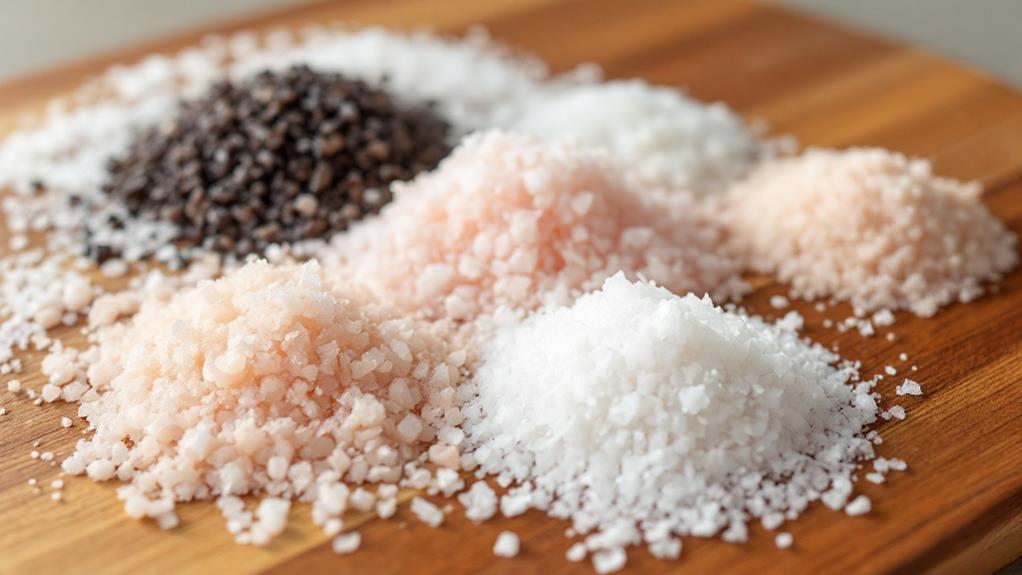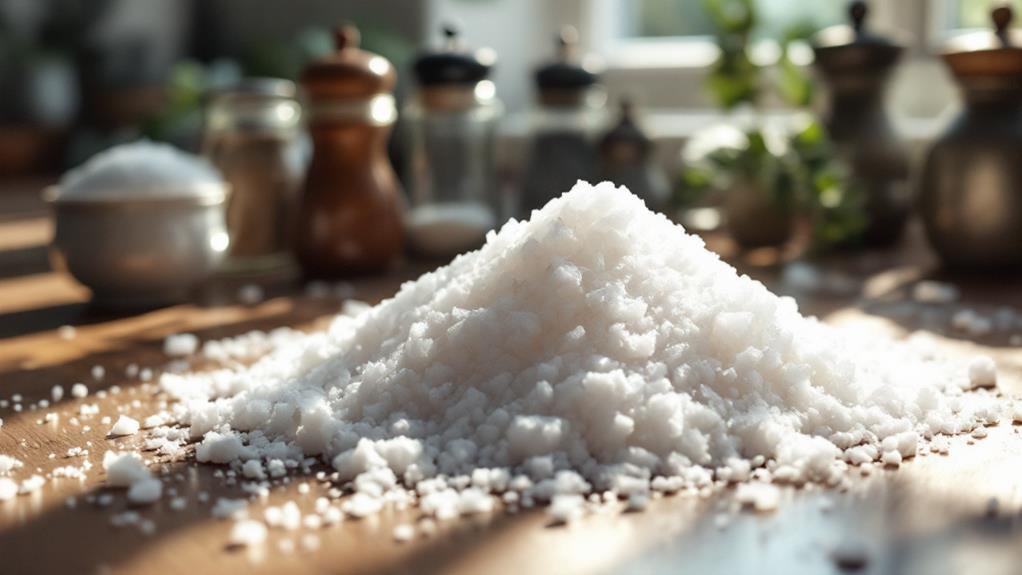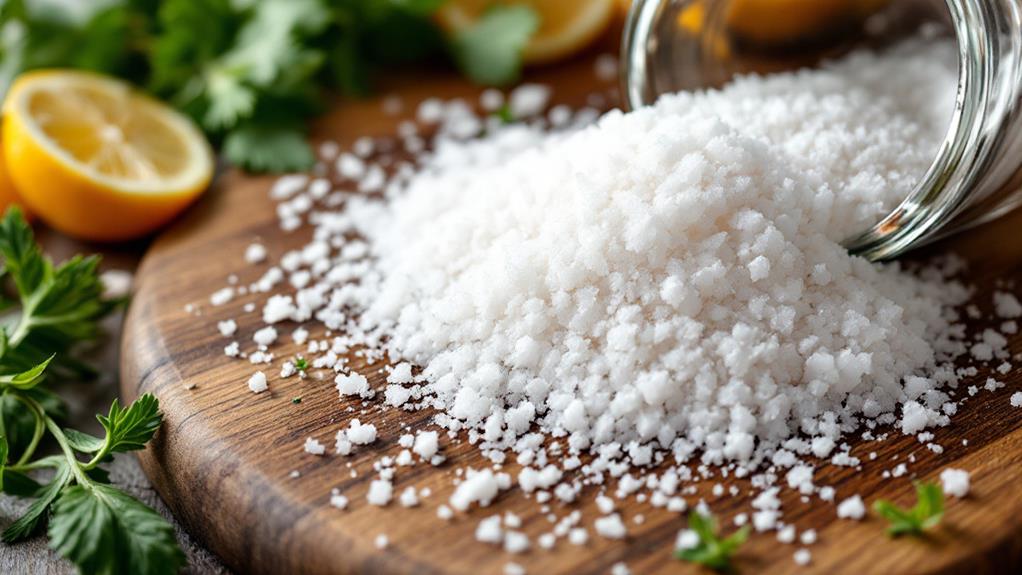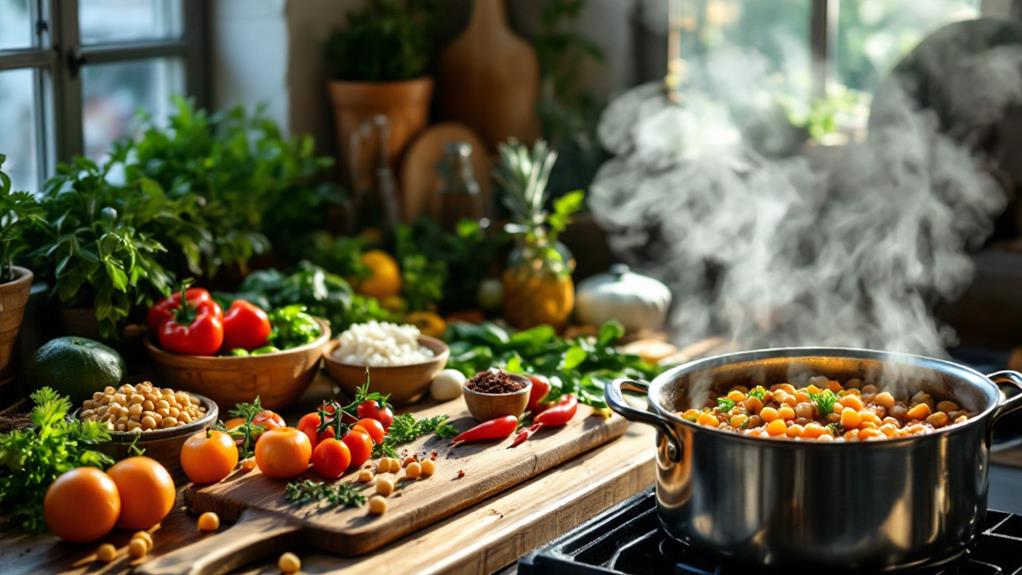The Ultimate Guide to Pickling Salt: A Must-Have for Preserving
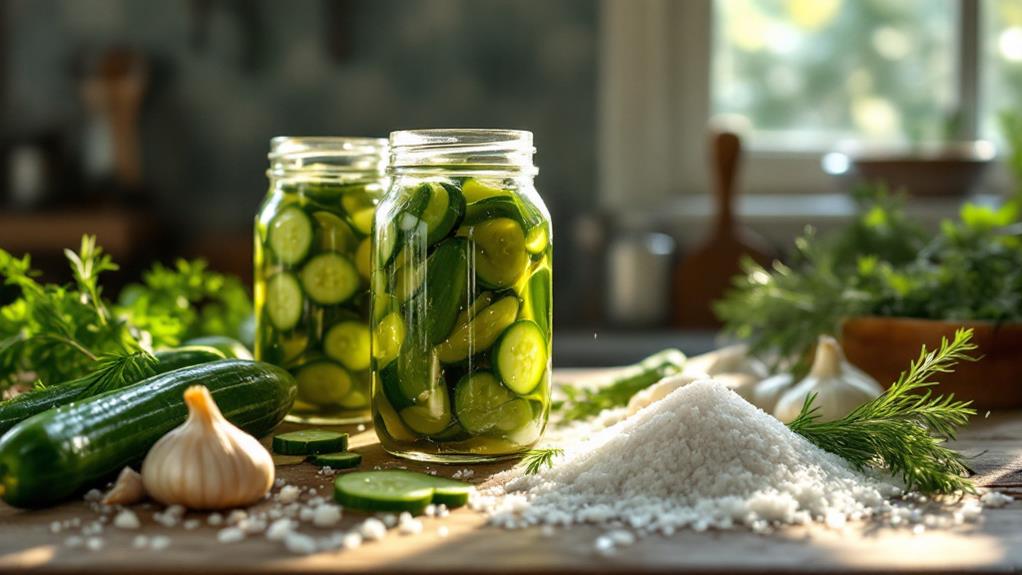
Picking salt is your go-to for flawless food preservation. This pure sodium chloride prevents cloudiness, ensuring your pickles look as good as they taste. Unlike table salt, it dissolves quickly without unwanted additives, maintaining true flavors. Kosher salt can work in a pinch, but you'll need to adjust measurements due to its coarse texture. Accurate salt choice is critical to avoid spoilage and flavor mishaps. Find pickling salt easily in supermarkets or online, with trusted brands like Ball and Morton. To master the art of pickling and learn about alternative techniques, you're just a step away from becoming a pro.
Importance of Pickling Salt
When you're diving into the world of pickling, understanding the role of pickling salt is fundamental. This pure sodium chloride, also known as canning salt, plays a key part in preserving foods by preventing your brine from turning cloudy. Its fine texture guarantees quick dissolution, helping you achieve the precise salt concentration needed for fermented pickles and sauerkraut. If you use table salt instead, the anti-caking agents it contains can make your pickled products less appealing.
Correct salt concentration is crucial for food safety. Using the wrong type of salt can lead to improper curing, allowing harmful bacteria to grow, and increasing the risk of botulism. That's why proper canning practices emphasize the use of pickling salt. Unlike other salts, it doesn't contain additives that might compromise the clarity and safety of your preserved goods.
You can easily find pickling salt at supermarkets and hardware stores. Brands like Ball and Morton offer reliable options, guaranteeing your home-canned pickled products maintain their quality. By choosing pickling salt for your preserving needs, you're taking a significant step toward achieving safe, clear, and delicious results every time.
Types of Salt for Pickling
In the domain of pickling, you'll encounter several types of salt, each with its distinct characteristics. Pickling salt, also known as canning salt, is the star of the show. It's a pure form of sodium chloride that doesn't contain additives like anti-caking agents. This purity guarantees your brine remains clear, which is essential for the visual appeal of pickled foods. When you're preserving foods, clarity is key.
- Pickling Salt (Canning Salt): Ideal for recipes, it keeps your brine clear and your pickled foods looking pristine. Brands like Ball and Morton offer readily available options.
- Kosher Salt: A viable substitute for pickling salt, though you'll need to adjust measurements due to its coarser grain size. Remember, precision in recipes is important for safety and quality.
- Table Salt: While common, it contains anti-caking agents that can cloud your brine, impacting the appearance of your pickled foods.
When using any type of salt for pickling, precise measurement is essential. Weigh your salt to guarantee the right concentration, as variations can affect both safety and flavor in your recipes. Choose wisely to perfect your pickling endeavors.
Benefits of Using Pickling Salt
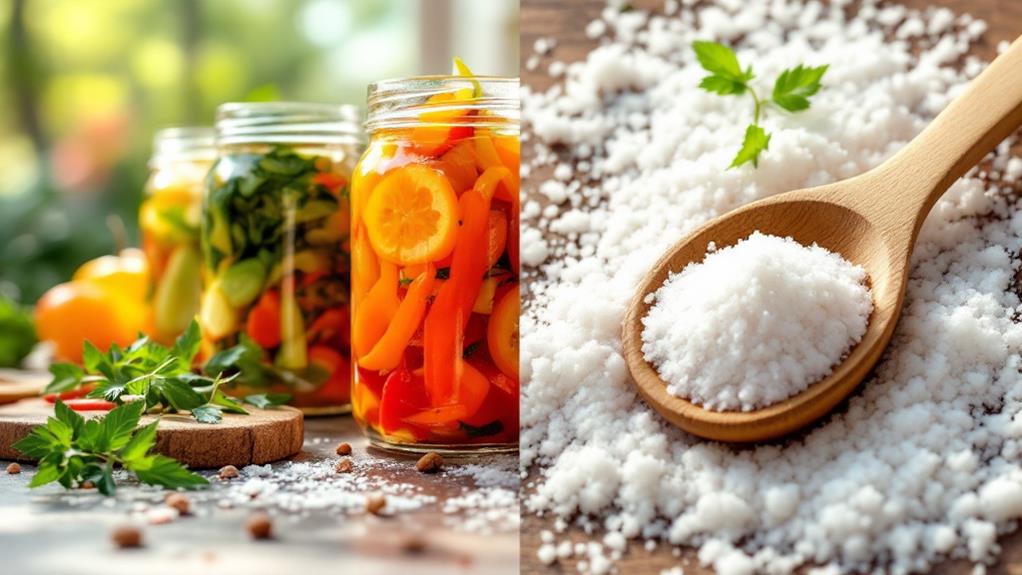
Having investigated the different types of salt for pickling, let's focus on the benefits of using pickling salt. Pickling salt, also known as canning salt, is a must-have for preserving food. It's pure sodium chloride, meaning it contains no additives that could cause unwanted chemical reactions. This purity guarantees that your brine remains clear, enhancing the visual appeal of your pickled creations. Unlike table salt, which can lead to cloudiness due to anti-caking agents, pickling salt keeps your brine pristine and your jars of pickles looking perfect.
The fine texture of pickling salt allows it to dissolve quickly in any solution, making it ideal regardless of you're fermenting cucumbers or doing a quick pickle. This quick dissolution guarantees even distribution of salt, which is essential for both flavor and preservation. Furthermore, using pickling salt helps maintain the true flavor and color of your preserved foods. Without additives, there's no risk of altering the taste or appearance of your pickled goods.
Moreover, pickling salt supports safe canning practices. It guarantees the right concentration needed to prevent harmful bacteria growth, reducing spoilage risks. Choose pickling salt to assure both the quality and safety of your preserved delights.
Comparing Pickling Salt Alternatives
One primary consideration in pickling is choosing the right salt, and while pickling salt is the top choice, there are alternatives if needed. Pickling salt, or canning salt, is pure sodium chloride, free from additives like anti-caking agents. This purity prevents cloudiness in your brine, guaranteeing clear and visually appealing pickles. But if you can't find pickling salt, you might consider other options.
- Table salt: This common household salt isn't ideal for preserving. Its anti-caking agents can make your brine cloudy, affecting the look of your preserved foods.
- Kosher salt: A widely available alternative, kosher salt can work as a substitute. However, its larger grains mean you need to adjust quantities carefully, ideally by weighing to maintain proper salt concentration.
- Other salts: While in a pinch you might reach for other salts, beware. Improper substitutions can lead to incorrect salt levels, risking undesirable results or even harmful bacteria growth.
Popular brands like Ball and Morton offer reliable pickling salt options, assuring your food preservation efforts maintain quality and safety. When preserving, always prioritize accuracy in your salt choice to guarantee the best results.
Proper Techniques for Salt Use
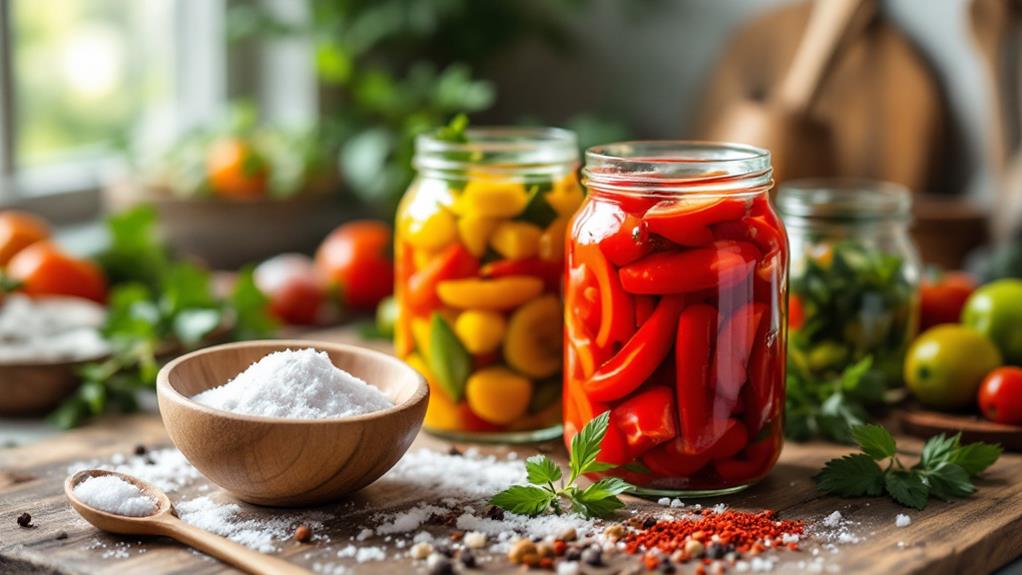
To master the art of pickling, you must pay careful attention to how you use salt. Pickling salt, being pure sodium chloride, is your go-to choice for preserving. It guarantees your brine remains clear, enhancing the visual appeal of your pickled products. Avoid table salt in your canning recipes, as its anti-caking agents can cause unwanted cloudiness, detracting from the appearance.
When substituting kosher salt for pickling salt, keep in mind that their grain sizes differ. This affects the volume, so weigh your salt for accuracy to achieve the proper salt concentration. Too little salt can lead to spoilage, compromising your efforts, while too much can adversely affect the flavor and texture.
In fermentation processes, such as making sauerkraut or fermented pickles, pickling salt is ideal. It maintains the quality and safety of your products by preventing harmful bacteria from thriving. Proper salt concentration is vital here too; it guarantees that your fermentation is successful and safe.
Where to Buy Pickling Salt
When you're ready to begin pickling, finding pickling salt is easy. You'll typically find it in the salt section of most supermarkets, often situated near other vital canning supplies. If you prefer shopping in-person, many hardware and big box stores stock pickling salt alongside canning jars and other tools needed for home food preservation. Popular brands like Ball and Morton offer reliable options, so you can confidently buy pickling salt from them. Here's where you can find pickling salt:
- Supermarkets: Look near the other canning supplies in the salt section.
- Hardware and Big Box Stores: Often found with canning jars and preservation tools.
- Online Platforms: Amazon offers different brands and quantities for convenience.
For those who value convenience, purchasing pickling salt online is a great choice. Platforms like Amazon allow you to investigate different brands and pricing options, making it simple to find what suits your needs. As for pricing examples, Ball pickling salt is about $10 for 2 lbs, while Morton offers a 4 lbs option around $22. With these tips, you're set to buy pickling salt and commence on your home food preservation adventure.

